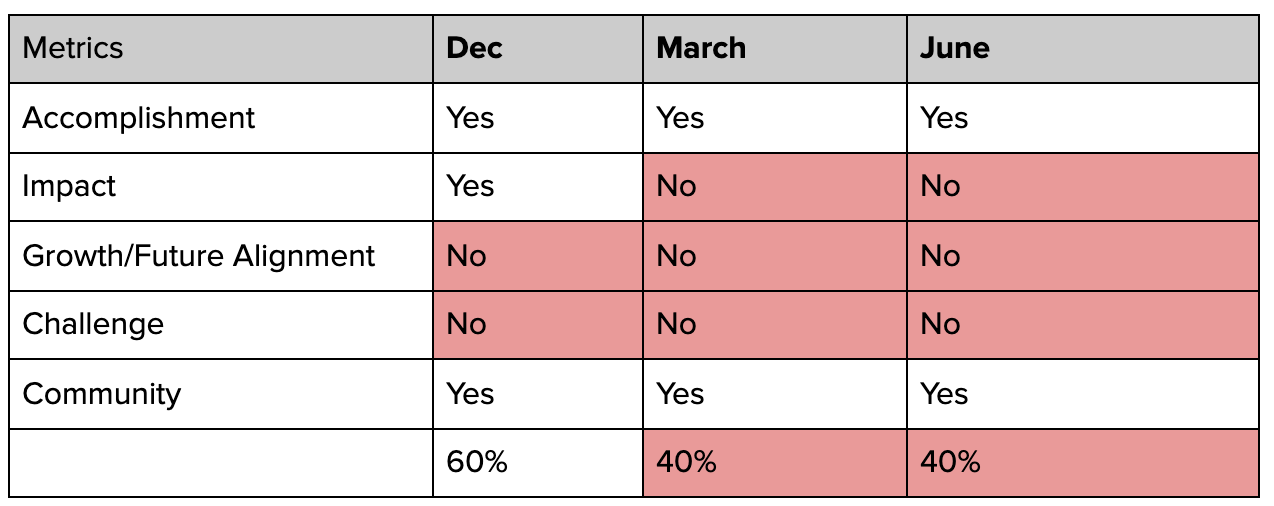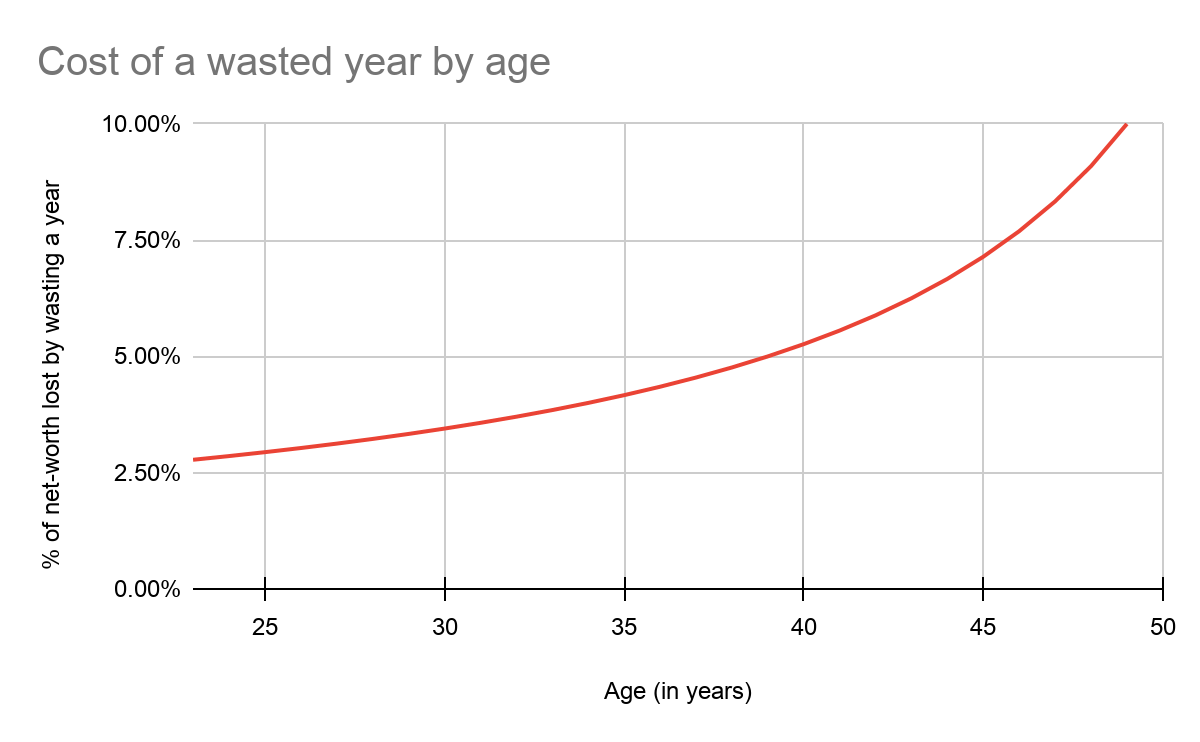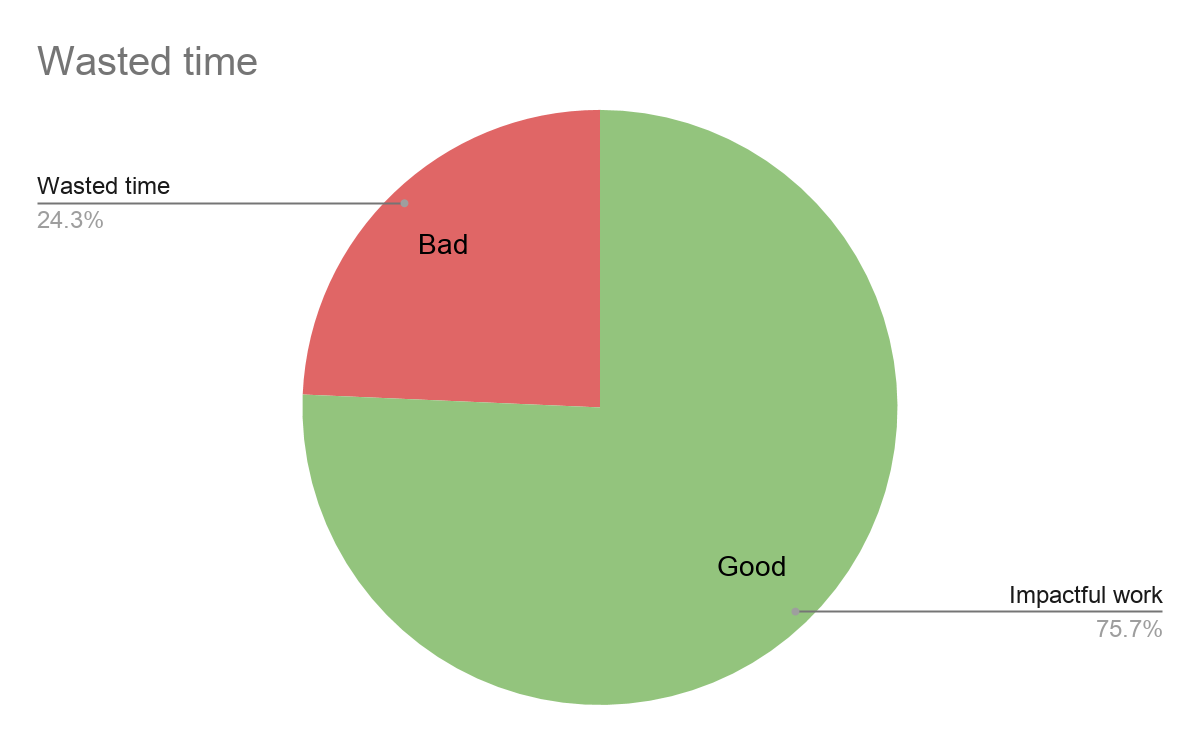I recently saw this tweet asking people about their career's most expensive mistake. The most common one was people staying too long at their jobs and not switching sooner.


I've seen people make this mistake over and over. Hell, I've made this mistake myself. Change can be scary. It requires you to get out of your comfort zone. But, in my experience, staying too long is one of the worst mistakes you can make in your career.
Complacency is cancer
One common trait I've observed in all great engineers is their sense of adventure. People who pigeonhole themselves into a specialty and do the exact same job for years tend to grow complacent. The problem is that stability is an innate human instinct. So you need to deliberately counterbalance this tendency. Taking risks and being uncomfortable is a muscle you have to train.
A friend of mine told me this story about wild ducks — Wild ducks migrate in the winter not because of the cold but because of the food. If you feed them, they won't migrate. Keep feeding them for a few years in a row, still won't migrate. Then stop all of a sudden, they won't migrate, and they'll die. The moral is that you can tame wild ducks, but you can't wildify tamed ducks (that's why there isn't even such a word as wildify). So you have to be careful not to lose that hustle.
It's especially hard not to grow complacent when your job presents the same challenges repeatedly but beware of reputation damage. Don't think that people won't notice your lack of initiative. It shows on your resume in the form of years in the same position without a promotion or significant achievement to speak of. People know. Many top founders and companies in the valley treat such engineers as walking red flags. Your choice becomes limited to employers who want a cog in the big machine while your career will fade into a 9-5 job. If you are ambitious and want to build a good reputation for yourself in the valley, if you don't want your talent to go to waste - treat complacency like cancer.
A misplaced sense of loyalty
I'm lucky I live in San Francisco. I have some incredibly smart and talented friends who are engineers in the valley. One such talented friend of mine was an early employee at a transportation startup. She had grown tired of her role and was burnt out. She told me she wasn't leaving her company because it would be like abandoning her people. A few months after, during her perf, she received feedback that she seemed slow and disengaged. Yikes! By staying for loyalty, she was hurting her brand.
Staying in a job for loyalty or money's sake is like staying in a bad marriage for the sake of kids. It's not healthy for anyone involved. Companies only want your loyalty if you are engaged and have fun doing your job — true loyalty means leaving when your heart isn't in it anymore.
My friend, the talented engineer, got laid off from her startup at the beginning of COVID. When push comes to shove, companies do what's best for their business, and you should not feel bad for doing the same.
Optimizing learning over money early in your career.
After I graduated from grad school, I went to work at Apple. I learned more in the first six months there than I had my whole time in school. However, around the 3-year mark, my learning curve had flattened entirely. I ultimately left after another year. I stayed that extra year due to loyalty to my colleagues, but that decision cost me dearly. I missed out on witnessing Uber's hyper-growth phase.
Since I left Apple, its stock has almost tripled while Uber's stock has been... I probably would be better off financially had I stayed. However, what I learned at Uber is way more valuable to me, given my career aspirations. Uber's bottom-up culture allowed me to grow beyond being just an average software engineer. I've had this fantastic opportunity to lead building of products with millions of $$ worth of business outcomes (detail in a separate post). I'm not sure I'd be half the engineer I am today had I stayed. I regret not leaving sooner.
How do you know when it's time for a change?
Determining when it's time to change can be challenging. If you're not paying attention, you lose precious years stagnating and being unhappy. I use this framework to evaluate if it's time for a change. I do this every quarter, but YMMV.
Accomplishment: Have I done anything noteworthy these last three months?
Impact: Would I write a line in my resume about the work I have done over these three months? Would I value this specific work experience if I was hiring for my own company?
Growth/Future alignment: Have I acquired valuable insights or skills? Are these skills aligned with my future goals?
Challenge: Have there been days when I was thinking about a work problem in the shower so profoundly that I forgot if I used the soap or not?
Community: Am I excited and happy to go to work every morning and see my teammates. Do I believe in the mission, vision, and leadership of this team or company?
I like to use the mnemonic: Am I Growing Complacent Currently
This is an excerpt of what my evaluation looked like before I quit my previous job.

The way I read this table, everything I'd done over a 6-month timeframe had no personal growth. I'd been working my ass off to achieve milestones I didn't find challenging. My accomplishments didn't seem impactful or align with my future goals. Reframing of the context made it very clear that it was time to change.
Anytime I score 40% or under, alarm bells go off. It's a sign that my job isn't meeting my metrics and that I need to stop and evaluate. Obviously, doing this is a bit uncomfortable, and that's half the point. It forces you to take a cold hard look at your career every quarter. It forces you to face the natural tendencies for complacency that may settle in.
You'll find yourself looking for reasons. People often use excuses like - "I just started working here," "it hasn't even been a year," I'm just waiting for my year-end bonus…". Resist the temptation.
It's important not to underestimate the opportunity cost. If you are an average 30 yr old engineer, let's say you want to retire reasonably by the time you are 60. You have at best 120 quarters left to make something of yourself. A year wasted at a poor job or role is equivalent to you throwing away 3.3% of your career. The older you get, the steeper your loss is.

As I was writing this blog post, I was curious to visualize what the wasted time breakdown looks like in my 8-ish year long career so far, and I must admit I am incredibly uncomfortable sharing this graph. So much so that I updated my personal OKRs to take this number down over the next few years.

I recommend everyone go through this basic math exercise. Because as we say in Eats - You can't fix what you can't measure.
Change doesn't always mean to quit.
I originally joined Uber to work on the security of Uber's self-driving car. But within my first two months there, I realized that I wanted to work on something I could ship to customers shortly. I love the gratification of watching my work have an impact on millions of customers on a regular basis ( Marshmallow test be damned ). A self-driving car is futuristic and cool, but given the safety implications, it isn't a product that you can ship overnight. I stayed on for another six months before switching to UberEats. In hindsight, I should have switched sooner. Staying for six months in a role that I wasn't passionate about showed up in terms of impact. It slowed down my career trajectory at Uber.
Change doesn't always mean having to quit your job. It could be something as simple as changing the project you are working on or switching teams. People often ask how long should they stick around in a job that's not working out. In my opinion, time is the wrong metric here. Three months can be too long if you know this job isn't for you. Ten years could be too short if your objectives are being met.

If you are ambitious about your career and want to achieve specific goals, you can't get there by random accident. You need to be deliberate and keep your objectives in mind every step of the way. Engineering jobs are plentiful in the current tech era (yes, despite COVID), engineers are in high demand. There are only wrong reasons to stay in a role for too long and grow complacent. Quoting one of the greatest philosophers of our times, Shia Labeouf - "JUST DO IT."

Thanks, Flo Crivello, for the tweet inspiration and reading the draft




